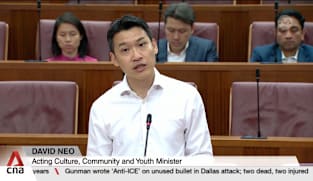Gan Siow Huang on SkillsFuture Singapore Agency and Skills Development Levy amendment bills
The laws will be strengthened to fight fraud and abuse of the Government's incentives and loans for continuing education and training. Under the SkillsFuture Singapore Agency (Amendment) Bill, SkillsFuture Singapore (SSG) will have the powers to enforce and prescribe new offences related to "abusive funding arrangements". These include transactions aimed at abusing the use of an incentive, grant or loan from the agency. A person convicted of the offence also has to pay a mandatory penalty, in addition to the punishment of a fine or imprisonment, or both. It would also become an offence for anyone to put up misleading advertisements that a course is funded or accredited by SSG. Offenders must also take remedial actions. Under the Skills Development Levy (Amendment) Bill, legislative levers will be tightened to prevent abuse of the funding framework. It will align the definition of "remuneration" in the Skills Development Levy Act with that of "wages" in the Central Provident Fund Act. This will allow the same basis of monthly income to be applied across organisations when calculating funds payable. Minister of State for Education Gan Siow Huang, who outlined the key changes in Parliament on Monday (Jan 9), said the intention is not to penalise administrative lapses or genuine mistakes of the training providers. She said the proposed changes aim to provide SSG with the necessary powers to investigate and take appropriate actions against errant activities and to do so consistently across the different funding sources. By safeguarding those who are genuinely pursuing training, Singapore hopes to create a vibrant continuing education and training ecosystem of quality training providers and programmes where companies and individuals participate in and will benefit from skills upgrading. "The Government's continued investment in SkillsFuture is critical, given that lifelong learning and employability is a new pillar under our social compact," she said. "To do so, we need to strengthen the quality of the training and adult education ecosystem, including stepping up our legislative levers," she said. This will allow individuals and employers to have greater confidence to participate in training, better protect genuine learners from being misled into taking courses that are of little or no value and ensure that the funds and resources will be channelled towards legitimate training providers and courses and put to their intended use. "Together, these moves will strengthen the SkillsFuture movement and support our efforts to equip Singaporeans with the skills needed to seize the opportunities ahead," she said.
The laws will be strengthened to fight fraud and abuse of the Government's incentives and loans for continuing education and training. Under the SkillsFuture Singapore Agency (Amendment) Bill, SkillsFuture Singapore (SSG) will have the powers to enforce and prescribe new offences related to "abusive funding arrangements". These include transactions aimed at abusing the use of an incentive, grant or loan from the agency. A person convicted of the offence also has to pay a mandatory penalty, in addition to the punishment of a fine or imprisonment, or both. It would also become an offence for anyone to put up misleading advertisements that a course is funded or accredited by SSG. Offenders must also take remedial actions. Under the Skills Development Levy (Amendment) Bill, legislative levers will be tightened to prevent abuse of the funding framework. It will align the definition of "remuneration" in the Skills Development Levy Act with that of "wages" in the Central Provident Fund Act. This will allow the same basis of monthly income to be applied across organisations when calculating funds payable. Minister of State for Education Gan Siow Huang, who outlined the key changes in Parliament on Monday (Jan 9), said the intention is not to penalise administrative lapses or genuine mistakes of the training providers. She said the proposed changes aim to provide SSG with the necessary powers to investigate and take appropriate actions against errant activities and to do so consistently across the different funding sources. By safeguarding those who are genuinely pursuing training, Singapore hopes to create a vibrant continuing education and training ecosystem of quality training providers and programmes where companies and individuals participate in and will benefit from skills upgrading. "The Government's continued investment in SkillsFuture is critical, given that lifelong learning and employability is a new pillar under our social compact," she said. "To do so, we need to strengthen the quality of the training and adult education ecosystem, including stepping up our legislative levers," she said. This will allow individuals and employers to have greater confidence to participate in training, better protect genuine learners from being misled into taking courses that are of little or no value and ensure that the funds and resources will be channelled towards legitimate training providers and courses and put to their intended use. "Together, these moves will strengthen the SkillsFuture movement and support our efforts to equip Singaporeans with the skills needed to seize the opportunities ahead," she said.



















